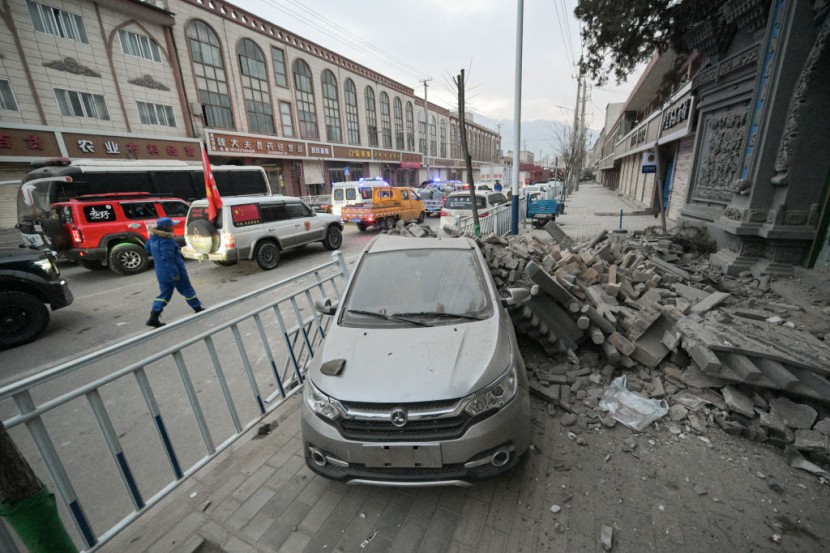China witnessed grieving relatives mourning the loss of their loved ones in temporary shelters amid freezing temperatures in the mountains of northwest China, surrounded by destruction.
The earthquake, which struck on Monday night, resulted in the collapse of houses, claiming the lives of at least 131 people and leaving over 900 injured, according to Chinese media reports. The majority of casualties occurred in Gansu province, with the remaining casualties in the neighboring province of Qinghai, as per The Independent.
Devastating Earthquake in China

In the early morning darkness, Ma Lianqiang stood beside his deceased wife, wrapped in blankets, in a makeshift tent illuminated by a single overhead light. His wife was tragically hit and buried under debris in her mother's house, where she had sought refuge due to her illness.
Despite extensive damage to their own home in Yangwa, a village in Gansu province, Ma and several other family members managed to survive. Ma's father miraculously rescued his injured son, pulling him out from the rubble. Ma's uncle recalled how they heard the earthquake and witnessed their house collapsing. They crawled out in fear and managed to make it to safety.
Approximately 80,000 individuals have been relocated to Gansu, as authorities strive to provide relief to those affected by the disaster. Relief tents were distributed throughout the area, rescuing many from the harsh freezing temperatures. Meanwhile, in Qinghai province, rescue teams are tirelessly searching for 16 missing individuals in areas extensively affected by landslides.
The death toll in Qinghai has risen to 18, with the number of missing individuals decreasing from 20 to 16. Though affected areas in both provinces continue to face challenges due to the earthquake, the search and rescue efforts are making progress.
The total injured individuals now stand at nearly 1,000, with 113 deaths reported in Gansu and 18 deaths in Qinghai. The magnitude-6.2 earthquake, followed by strong aftershocks, severely damaged more than 150,000 homes in Jishishan county near the border of Gansu and Qinghai provinces. The disaster resulted in mudslides, landslides, and damage to local infrastructure including power lines, according to Washington Post.
Read Also: UK's Rwanda Bill Passes First Vote in House of Commons, Marking Relief for Rishi Sunak's Efforts
Rescue Operations, Relief Efforts Continue in China
Despite the ongoing cold wave across China, responders, including firefighters, police officers, soldiers, and medics, are working diligently to save lives and provide aid. Rescue operations have successfully saved 78 individuals in Gansu, but the search for the 20 missing individuals continues in Minhe county, where buildings were half-buried in silt due to a mudslide.
Efforts are also being made to resettle affected residents, as bulldozers clear thick mud from the area. The freezing temperatures persist, discouraging affected residents from returning home and forcing them to seek warmth around fires in open spaces.
Ma Dongdong, whose house and business were damaged, expressed anxiety about the future. He and his family spent the first night in a field with neighbors, relying on a fire for warmth. They subsequently moved to a tent settlement housing around 700 people, awaiting the arrival of blankets and warm clothing.
The Gansu Provincial Seismological Bureau warns of the possibility of strong aftershocks in the coming days, with magnitudes of 5, based on the characteristics of the initial quake and historical seismic activity.
Experts attribute the relatively high number of casualties to factors such as the shallow depth of the earthquake, causing more intense shaking, as well as the predominately vertical movement and lower quality of buildings in the area. Additionally, the nighttime timing of the earthquake further contributed to the devastating impact on the community.
The affected region is remote and mountainous, home to predominantly Muslim ethnic groups and neighboring Tibetan communities. Despite its central location in China, it is commonly referred to as the northwest due to its proximity to China's more populated plains.
The earthquake and subsequent rescue efforts have generated significant discussion on social media platforms. Topics related to the earthquake and the response efforts have trended on Weibo, with millions of posts highlighting the heroic efforts of volunteers providing food and other assistance to the affected area, The Guardian reported.








